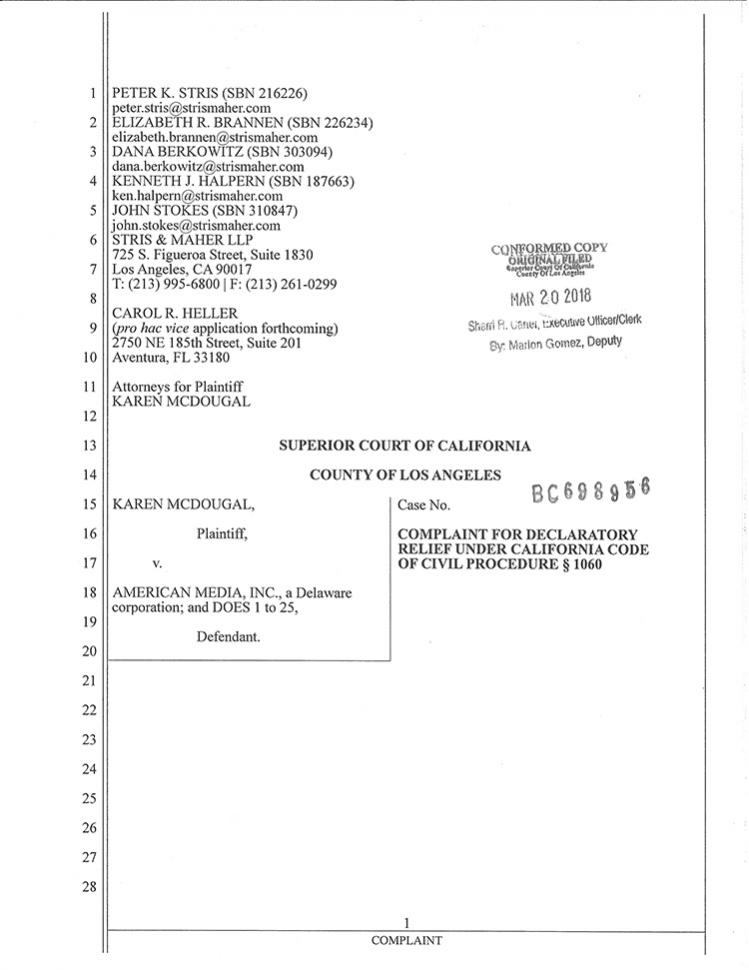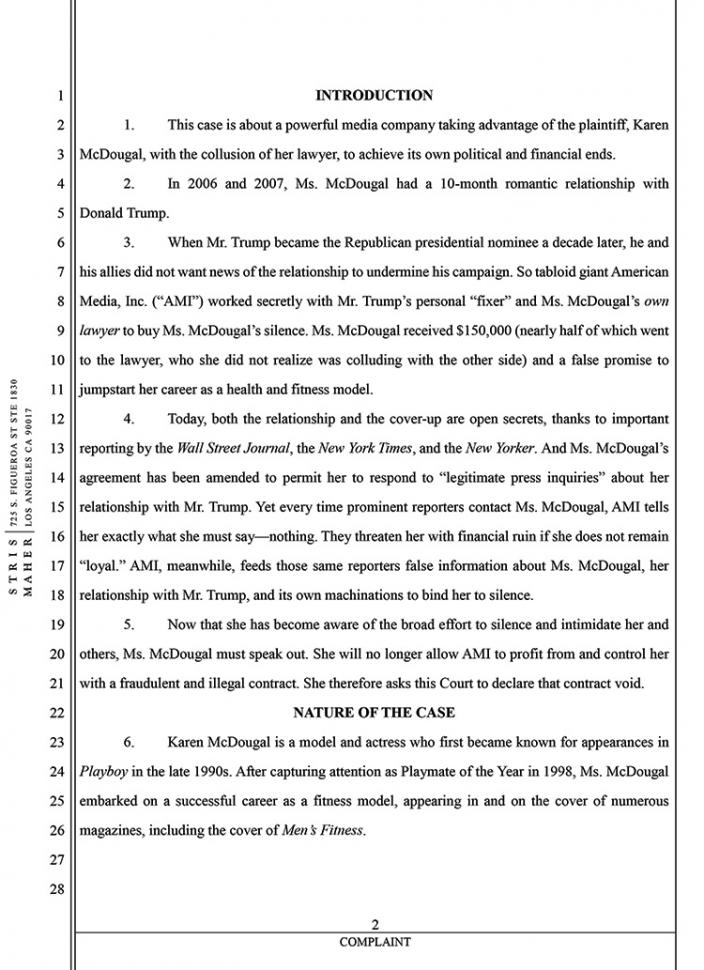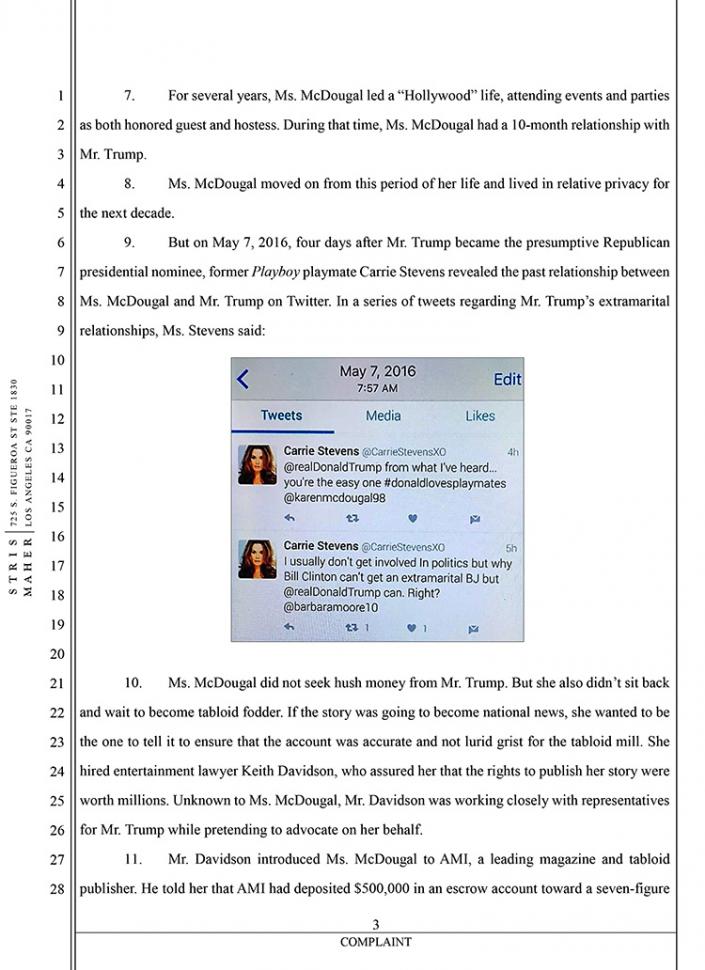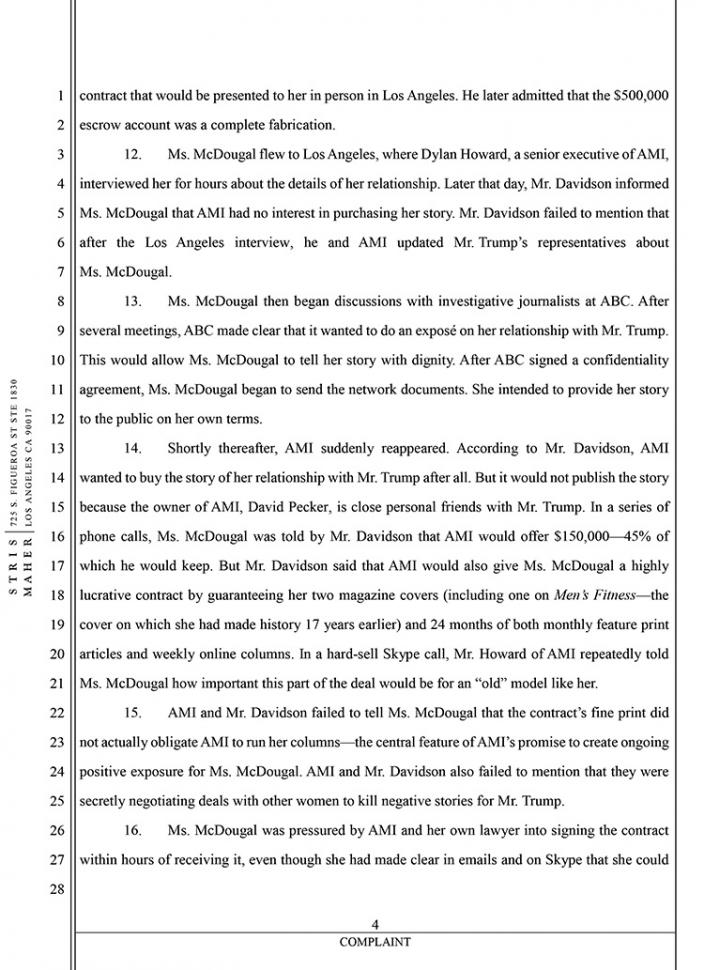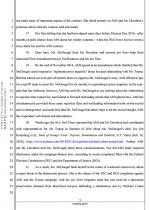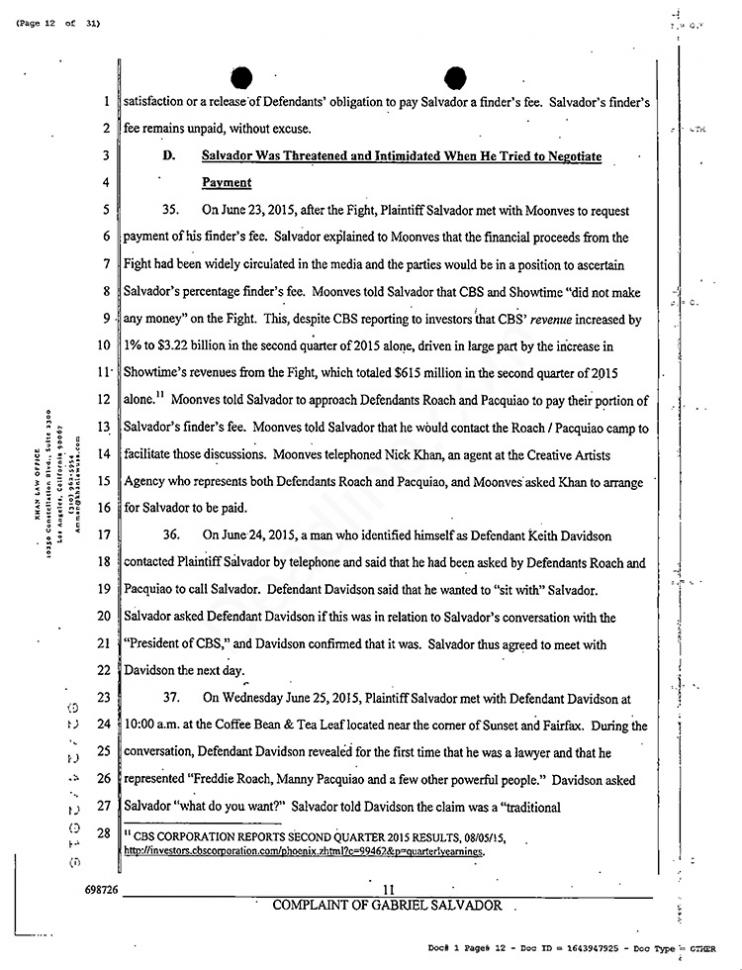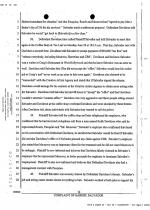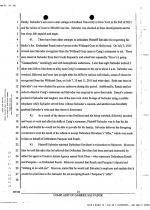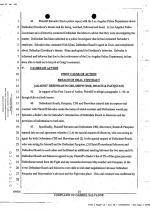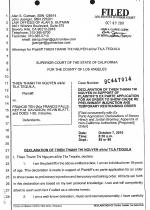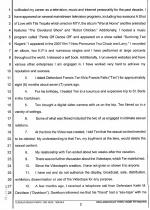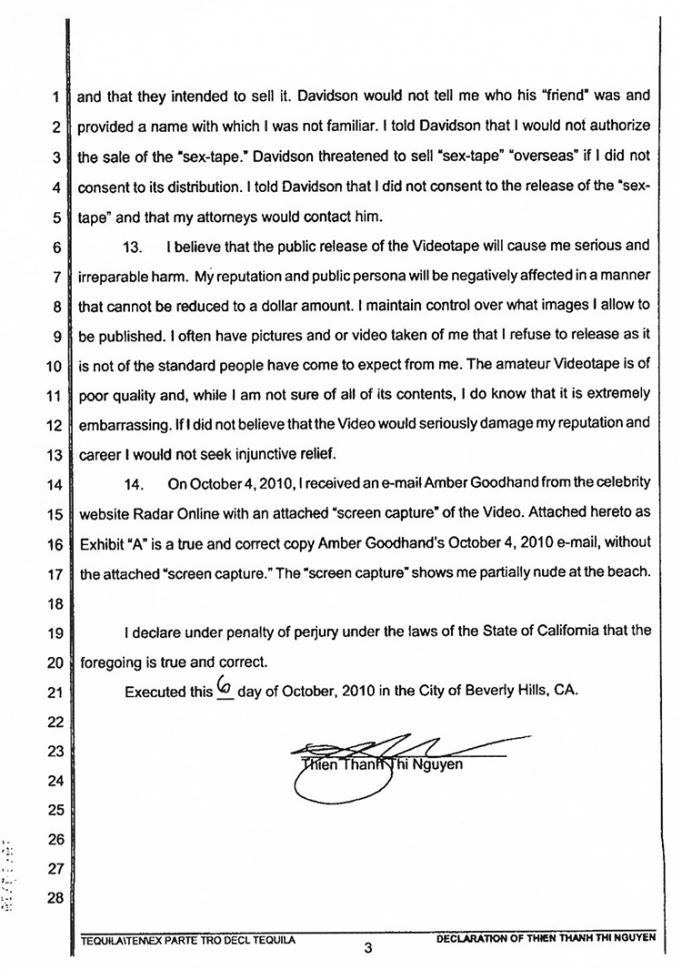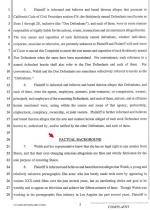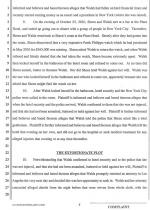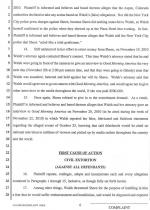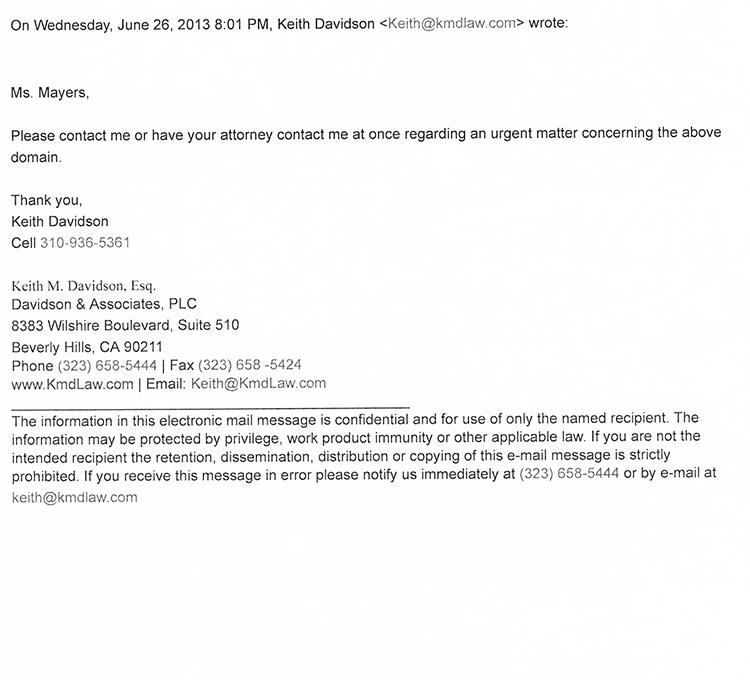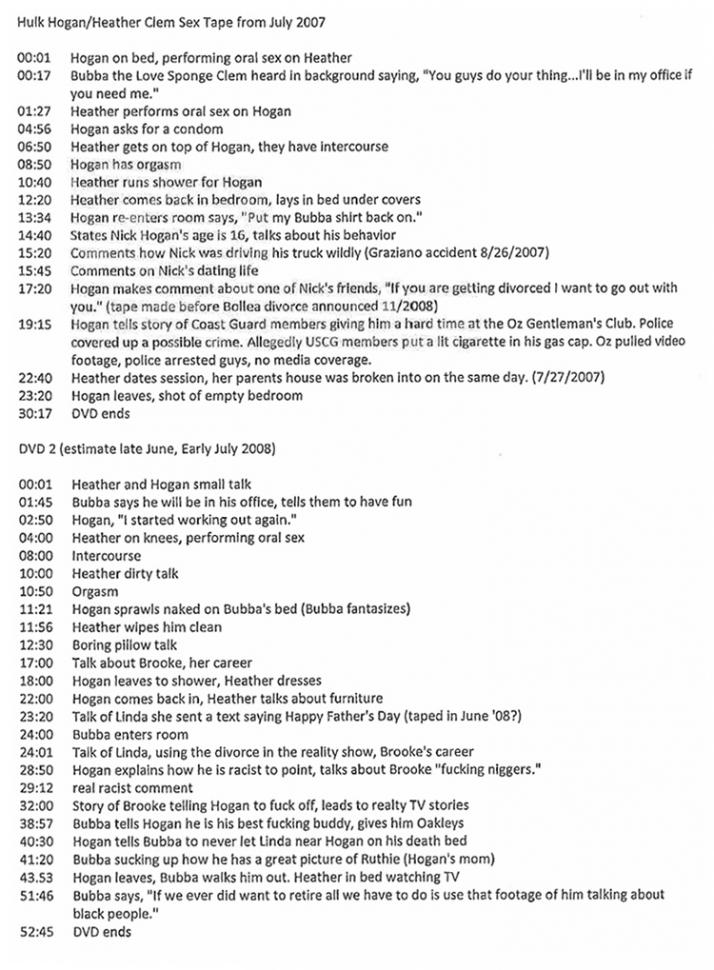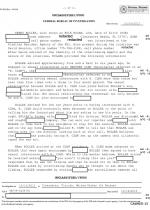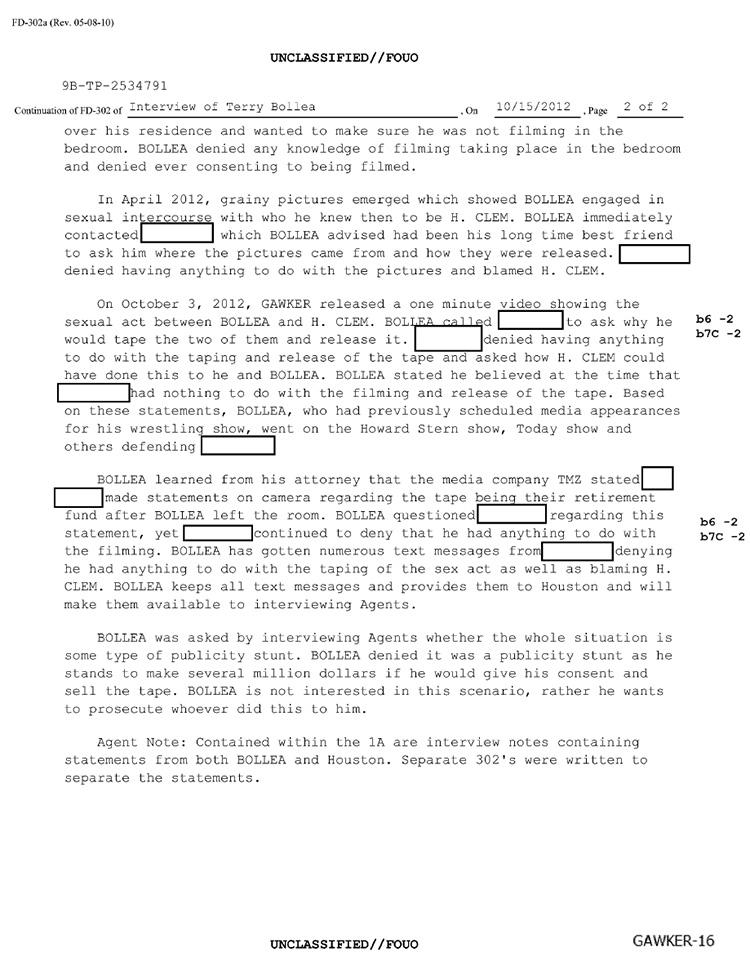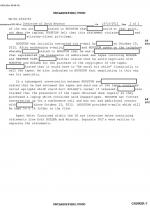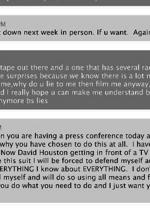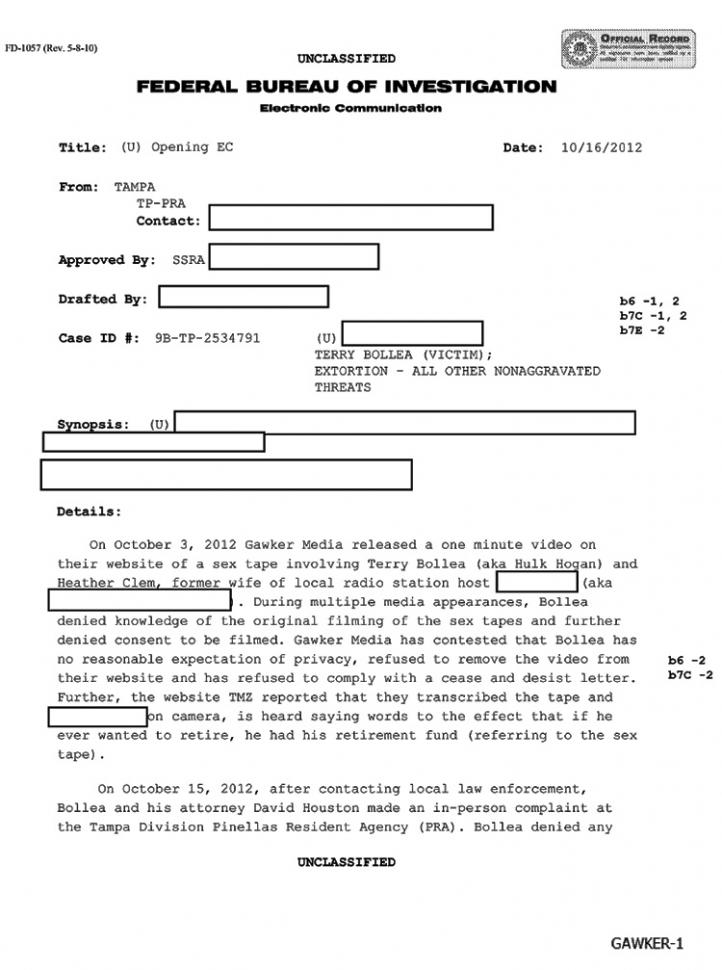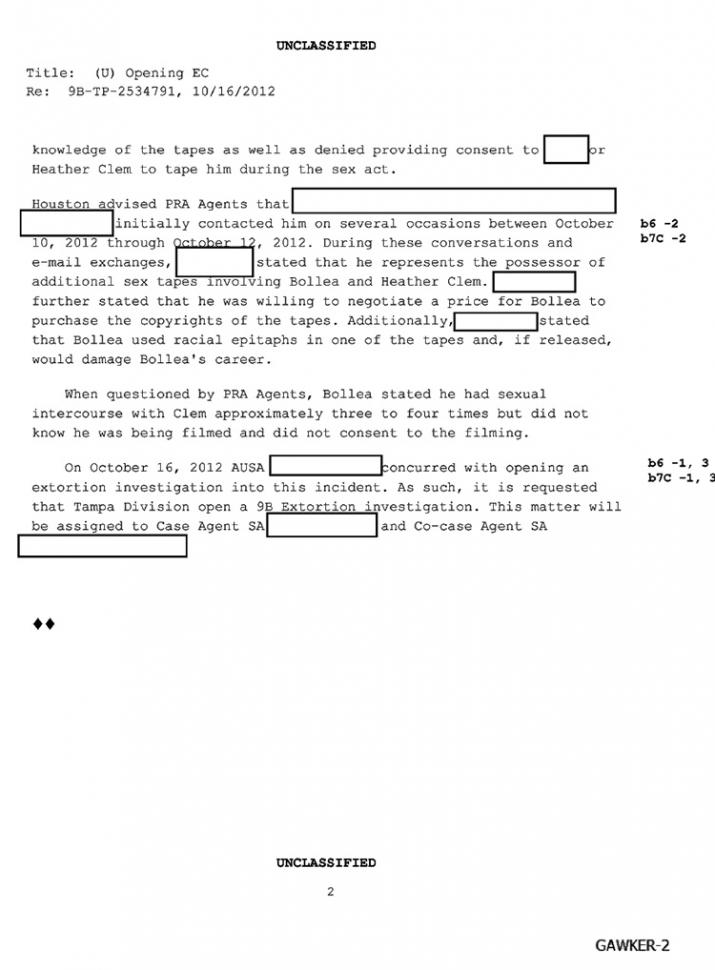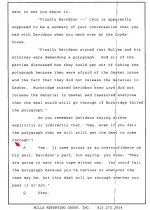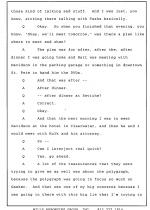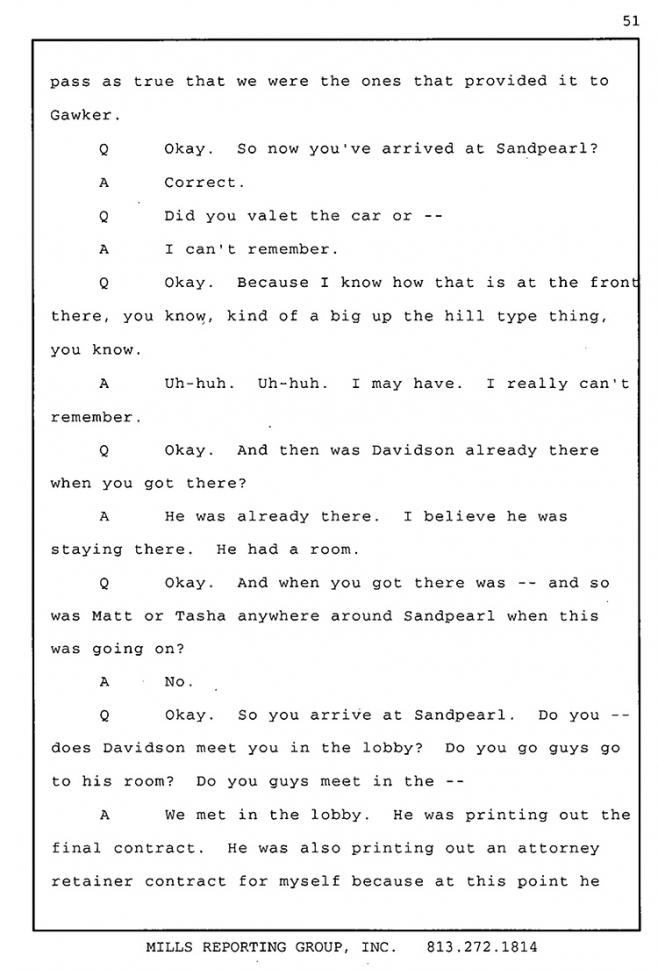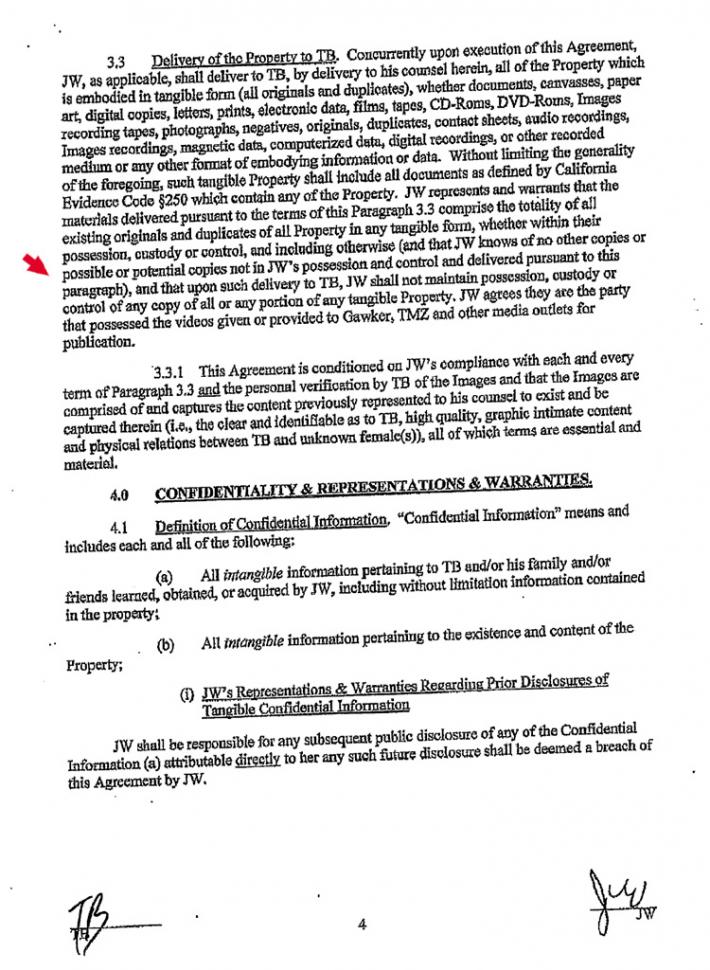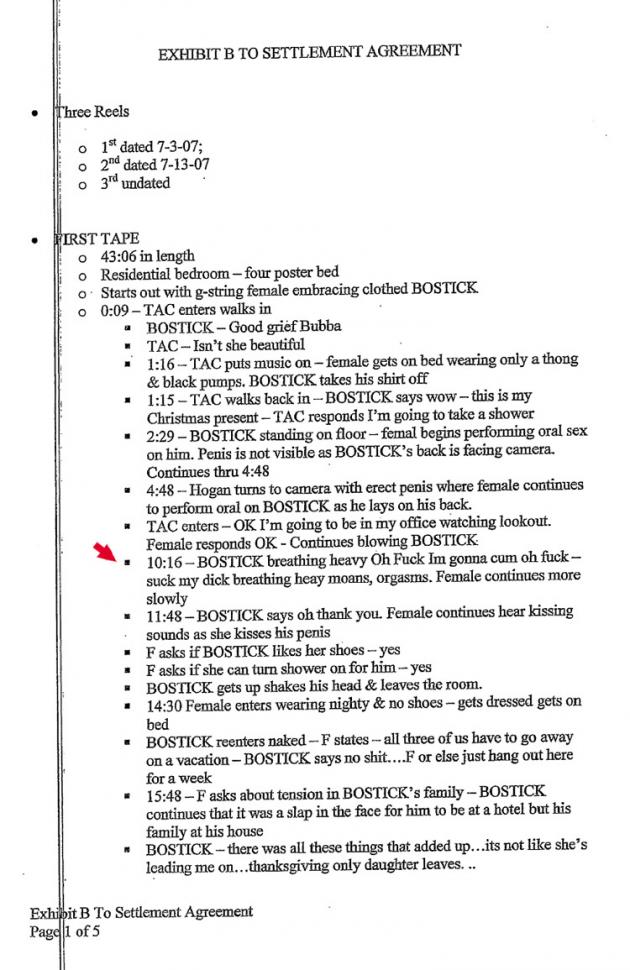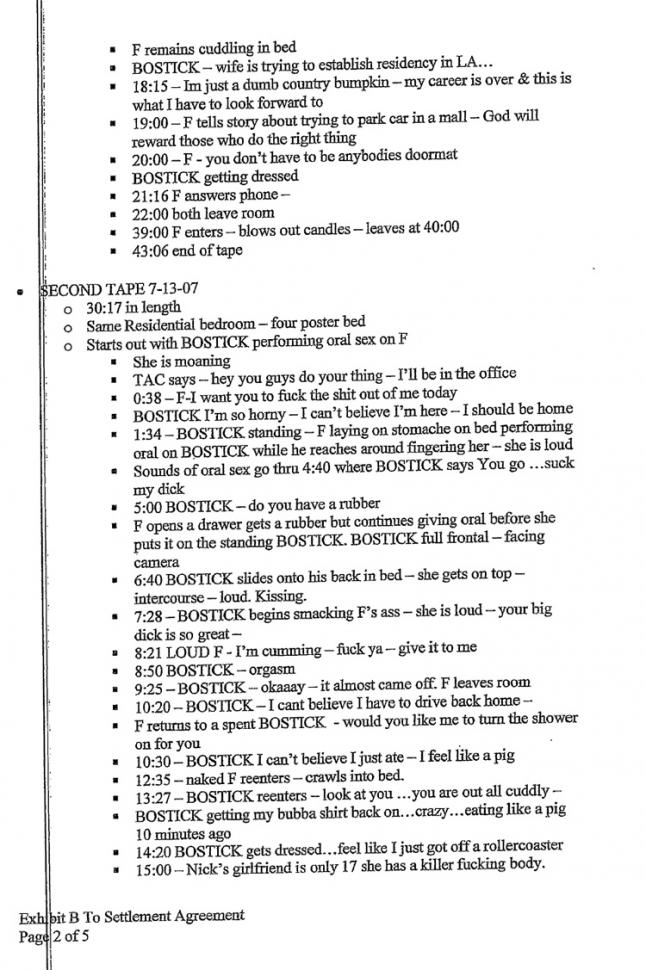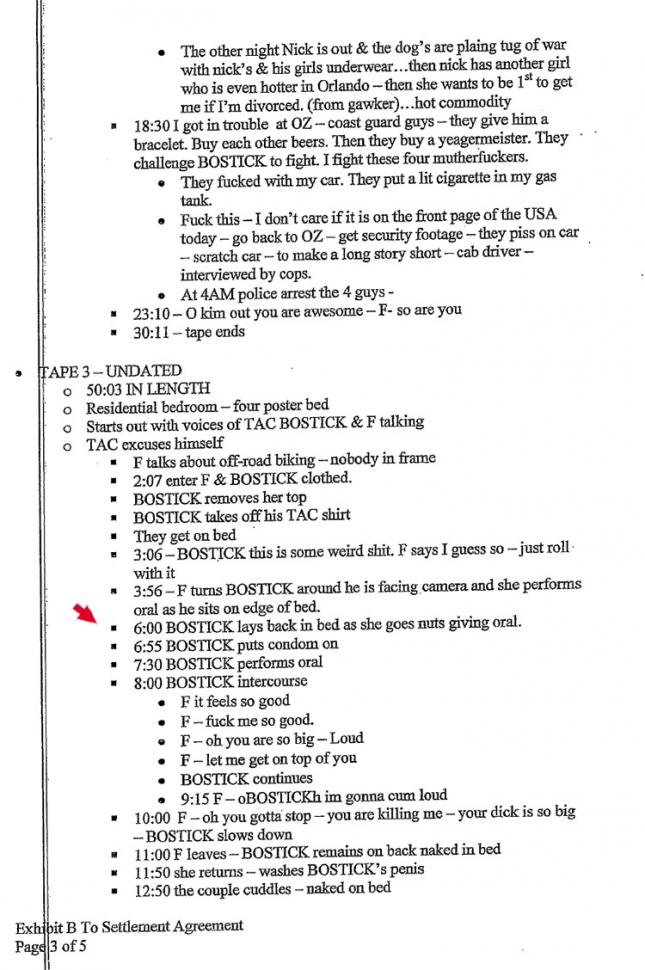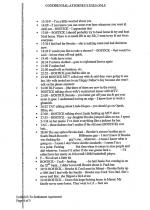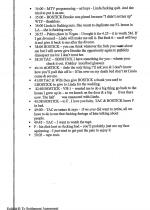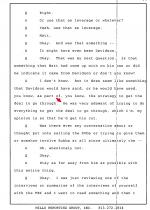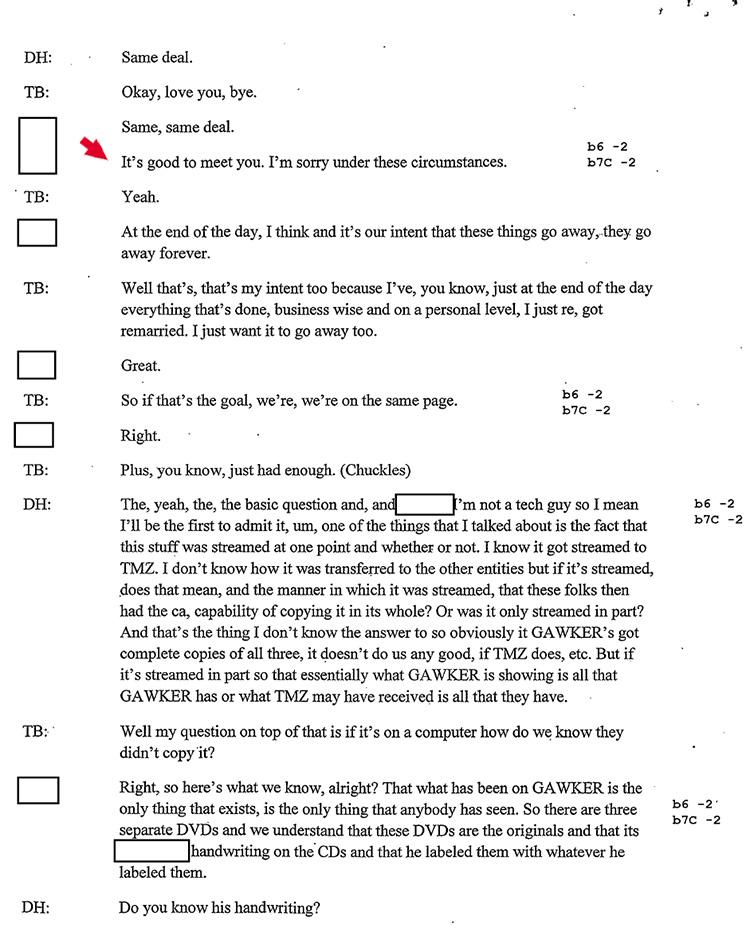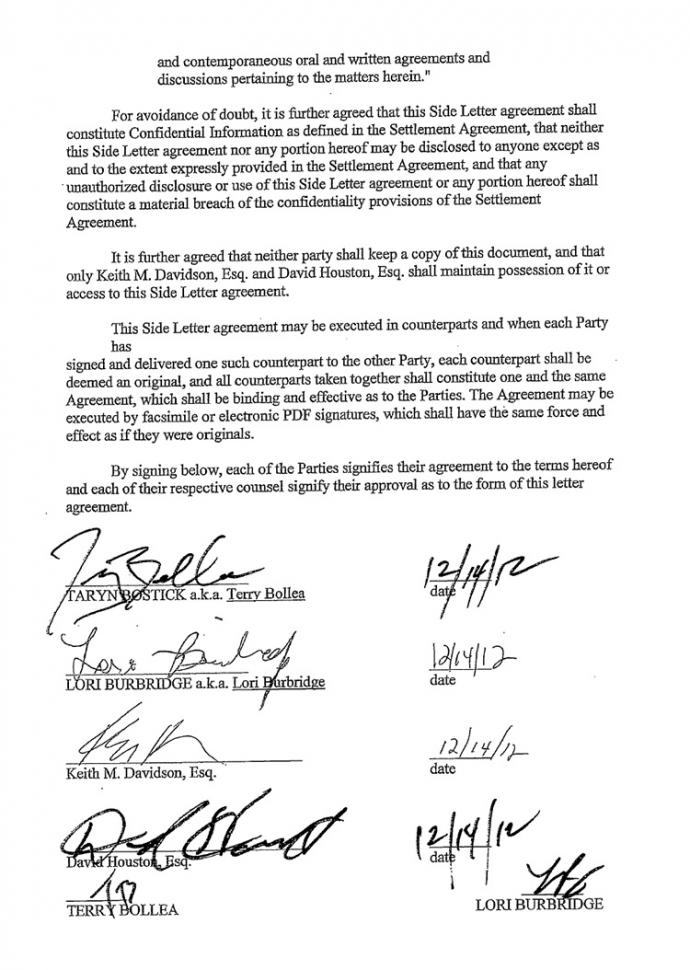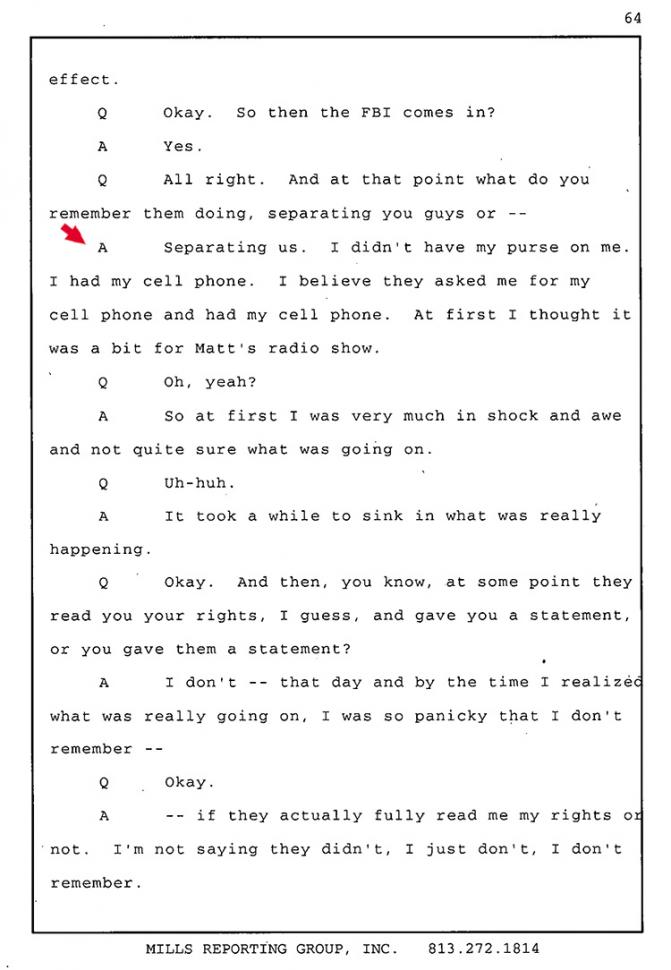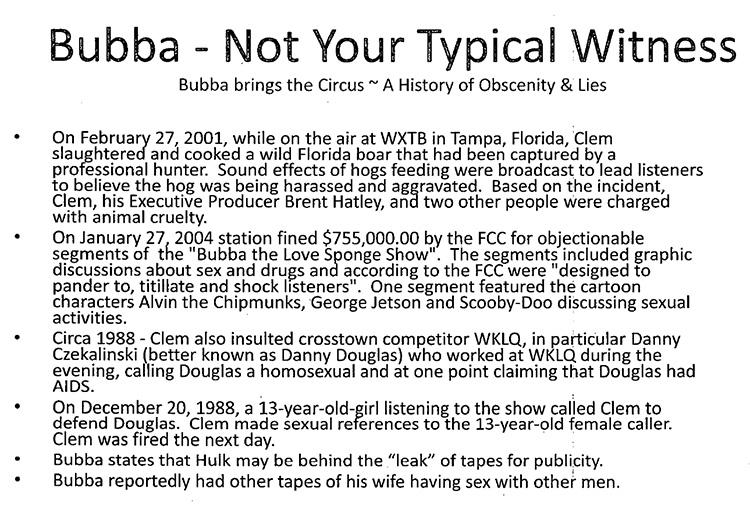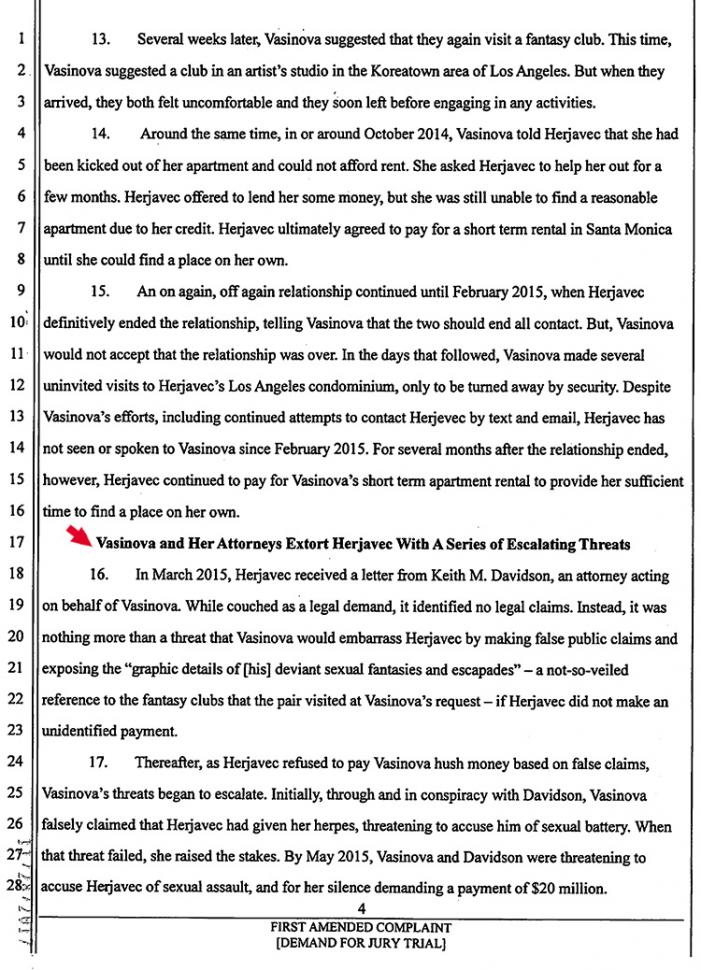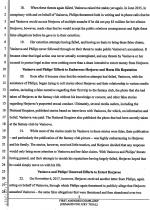Celeb Dirt To Be Sold? You Better Call Keith
A profile of the lawyer behind Trump "hush" deals

View Document
Keith Davidson
-
Keith Davidson
-
Keith Davidson
-
Keith Davidson
-
Keith Davidson
-
Keith Davidson
-
Keith Davidson
-
Keith Davidson
-
Keith Davidson
-
Keith Davidson
-
Keith Davidson
-
Keith Davidson
-
Keith Davidson
-
Keith Davidson
-
Keith Davidson
-
Keith Davidson
-
Keith Davidson
-
Keith Davidson
-
Keith Davidson
-
Keith Davidson
-
Keith Davidson
-
Keith Davidson
-
Keith Davidson
-
Keith Davidson
-
Keith Davidson
-
Keith Davidson
-
Keith Davidson
-
Keith Davidson
-
Keith Davidson
-
Keith Davidson
-
Keith Davidson
-
Keith Davidson
-
Keith Davidson
-
Keith Davidson
-
Keith Davidson
-
Keith Davidson
-
Keith Davidson
-
Keith Davidson
-
Keith Davidson
-
Keith Davidson
-
Keith Davidson
-
Keith Davidson
-
Keith Davidson
-
Keith Davidson
-
Keith Davidson
-
Keith Davidson
-
Keith Davidson
-
Keith Davidson
-
Keith Davidson
-
Keith Davidson
-
Keith Davidson
-
Keith Davidson
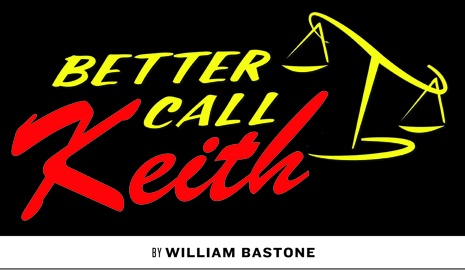
APRIL 4 --Who is Keith Davidson?
Until he negotiated financial settlements for a Playboy Playmate and a porn star who separately claimed affairs with a married Donald Trump, Davidson was a  low-profile Beverly Hills attorney whose solo practice operated from a small sublet office in a Wilshire Boulevard building.
low-profile Beverly Hills attorney whose solo practice operated from a small sublet office in a Wilshire Boulevard building.
But news of the six-figure payouts Davidson arranged in the weeks before the 2016 presidential election for model Karen McDougal and adult actress Stephanie “Stormy Daniels” Clifford have stripped the 46-year-old attorney of his anonymity. Now swamped with interview requests from journalists nationwide, Davidson has watched as his professionalism has come under attack and his e-mails, retainer agreements, and billing records related to the McDougal and Clifford deals have been leaked to the press.
The payments to McDougal ($150,000) and Clifford--whose $130,000 came via Michael Cohen, Trump’s personal attorney--have prompted the filing of complaints with the Federal Election Commission that contend the hush money amounted to improper in-kind contributions to the Trump campaign. Additionally, two Democratic representatives have asked the FBI to investigate the legality of “monetary payments to silence women alleging affairs with Mr. Trump.”
Davidson is no longer counsel for McDougal or Clifford, both of whom fired him and now complain of being dissatisfied with his representation and the restrictive nature of the settlements he negotiated on their behalf. The two women, Davidson  told TSG, are the only clients he has represented in connection with legal claims against Trump.
told TSG, are the only clients he has represented in connection with legal claims against Trump.
In a blistering March 20 lawsuit, McDougal charged that Davidson was guilty of legal malpractice. McDougal, 47, accused Davidson of lying to her, secretly “colluding” with Cohen, and pressuring her to sign an agreement she did not understand. While “pretending to advocate on her behalf,” Davidson was actually working in concert with Trump representatives, McDougal alleged. In response, Davidson said McDougal's complaint contained “an incomplete and misleading depiction of the facts, circumstances, and communications” related to his representation of the model.
While Cohen had no role in Davidson’s hiring by McDougal or Clifford, Trump’s attorney last year did steer a client to the California lawyer (long after the two hush money agreements were sealed). Cohen, who has hailed Davidson as an ethical and “tireless advocate for his clients,” referred Chuck LaBella, a television producer who worked closely with Trump on “The Apprentice,” Miss USA and Miss Universe telecasts, and the Comedy Central roast of the mogul, to Davidson. LaBella hired Davidson in the face of tweets by comedian Tom Arnold

charging that LaBella knew damaging information about Trump’s activities in Russia. In an October 2017 e-mail to Arnold’s lawyer, Davidson wrote that Arnold had falsely “implicated Chuck as a witness to sordid events regarding Donald Trump.” As a result, Davidson claimed, LaBella was “undergoing severe emotional distress.”
Davidson’s professional success--and the related entanglements he has found himself in--are a product of his position as the attorney to hire if you are seeking to monetize a celebrity sex tape or compromising information about public figures like Trump, Charlie Sheen, Tiger Woods, and Kanye West. Davidson specializes in extracting payments in exchange for the quashing of incriminating videos and/or details about sexual indiscretions, STDs, and all manner of regrettable behavior.
With a client roster that has included members of a distinctly Hollywood demimonde--strippers, escorts, pimps, tweakers, and celebrity hangers-on--Davidson is a legal grinder who has represented the interests of clients who would not get past the receptionist at established Century City law firms.
On multiple occasions, Davidson signed up clients thanks to a symbiotic relationship he developed with Mike Walters, one of the most influential figures in celebrity journalism. Walters, who worked at TMZ for more than a decade before recently launching his own gossip web site, steered individuals possessing celebrity dirt to Davidson for legal representation. The TMZ pipeline proved lucrative for the attorney, but it was an ethically dubious arrangement that Walters sought to keep secret.
In one instance, after heartily recommending Davidson to a sex tape peddler, Walters explained that the referral came with a caveat: If the source told anyone about the Davidson recommendation, Walters warned, he would “deny it to the bitter end.” Asked if he paid Walters for steering clients to him, Davidson would only say, “One, I don’t want to lie to you. 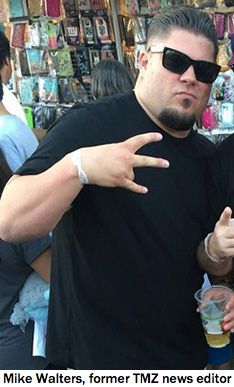 And two, I don’t want to ever have an adverse effect on someone else’s life.”
And two, I don’t want to ever have an adverse effect on someone else’s life.”
Mark Geragos, a veteran Los Angeles attorney, said that, “For the niche [Davidson] has carved out--which I guess most people would shy away from--he’s always struck me as honorable and a man of his word.” Geragos estimated that he has dealt with Davidson on more than ten occasions, and that each time, “I’m representing the target, he’s representing the person who’s seeking compensation.”
But for every opposing counsel who speaks highly of Davidson, there are lawyers like David Houston, who represents the wrestler Hulk Hogan. “He makes a living off creating misery for people, and it’s nothing to be proud of,” Houston said of Davidson. “And you certainly shouldn’t use your law degree to accomplish what amounts to, in my humble opinion, extortion.”
Owen McIntosh, who took over representation of a woman who fired Davidson, said that, “What he did in my case was inappropriate.” McIntosh, whose client claimed to have been assaulted by Lindsay Lohan, added that Davidson’s conduct was “not something that I would have done nor any attorney that I know of that understands law and obligations to a client.”
Davidson is currently a defendant in three separate lawsuits charging him with being a shakedown artist with a JD (he bristles at claims that extortion is a foundational element of his practice). His accusers are Hogan, one of the stars of ABC’s “Shark Tank,” and a waiter at a celebrity-drenched West Hollywood restaurant. Davidson has also been the target of federal and state criminal investigations stemming from the Hogan sex tape case. While those probes did not result in criminal charges, they uncovered questionable behavior on the part of Davidson, whose disciplinary record already includes a California state bar suspension for professional misconduct.
While some of Davidson’s lawyering might charitably be described as unorthodox, a lengthy investigation by The Smoking Gun has revealed that the attorney--who has practiced since 2000--has also apparently engaged in the kind of activities that result in severe disciplinary sanctions, such as directing clients to lie, splitting legal fees with non-lawyers, defying a judicial injunction, and practicing law while under suspension.
In addition to thousands of pages of court, police, and FBI records, TSG’s probe has relied on interviews with Davidson clients, opposing counsel, and business associates of the lawyer. Davidson was interviewed for more than six hours, though he declined to discuss certain topics on the record, citing attorney-client confidentiality restraints.
As he sat across from a TSG reporter in a Manhattan café, Davidson was affable, if a bit subdued during a late-February chat. He was there to make a last-ditch bid to soften a profile that he knew was the product of a reportorial excavation of his legal career.
Dressed in a suit and sipping an iced coffee, Davidson was towing luggage with him since he was next headed to the airport for a flight home. When it became clear that the reporter  had not been dissuaded, Davidson made a parting request. “Don’t kill me,” he laughed. “Just break a leg.”
had not been dissuaded, Davidson made a parting request. “Don’t kill me,” he laughed. “Just break a leg.”
As it turned out, though, Davidson made one more trip across the country to sit opposite the author of this story. He had a confidential matter to discuss, he explained on the phone, and it could only be done in person.
On March 18, Davidson arrived at 9:30 AM for a meeting at the same Greenwich Village restaurant where he had previously been interviewed. Within minutes of sitting down, the grim-faced attorney said, “Bill, while you’ve been investigating me, I’ve been investigating you.”
He then reached into his bag and retrieved a file folder, from which he removed a two-page document. Davidson explained that the memo he was about to hand over was prepared by an unnamed private investigator with whom he often works.
The document--which had several redactions at the top of its opening page--made a series of stunning claims that were purportedly backed up by intelligence reports. The Smoking Gun and this reporter, the memo stated, were connected to an international narcotics distribution ring overseen by an organized crime family in Italy. Aiding in these illicit endeavors, the memo alleged, was an attorney at the New York law firm which incorporated The Smoking Gun’s parent company. The web site was some kind of an elaborate front operation, according to the document Davidson eventually returned to his manila folder.
Told by the reporter that the memo’s claims were ludicrous, Davidson seemed unconvinced. All pursed lips and plaintive stares, the attorney acted pained that he had to break it to the reporter that others knew about the journalist’s criminal secret.
When asked if this reveal was some kind of desperate, extortiony intimidation attempt on his part, Davidson assured the reporter that he had no intention of circulating the memo. He simply flew across the country to share the information gathered by his PI. After Davidson declined an offer to have his memo published alongside this story, the reporter left the café.
But Davidson’s bizarre gambit did not end that Sunday morning.
On the following Tuesday, March 20, an e-mail arrived at the Manhattan law firm that formed TSG Industries, Inc. (an online search of New York State Division of Corporation records yields the firm’s name). The e-mail--sent from a Gmail account carrying the name “Joanna Martinix”--repeated claims that the site and its editor were engaged in “business activities” with an Italian organized crime family (these revelations supposedly emerged via “due diligence”). Martinix wrote that “our client” had met with a TSG reporter “this past weekend,” but that the journalist was “unwilling to resolve this matter amicably.”
The Martinix e-mail was sent to the lawyer who Davidson’s intel memo accused of being in criminal cahoots with TSG and Italian gangsters. Martinix requested that the attorney intercede with the reporter since publication of TSG’s story seemed imminent. The e-mail appeared to be a warning that the attorney and his law firm would somehow be smeared unless they stopped publication of this article.
Shortly after the e-mail was received, a man using the name Michael Wilhelm called the law firm. Wilhelm, dialing from a Google Voice number (518-407-3011), identified himself as a “consultant” calling on behalf of a client. He also sought to engage one of the firm’s lawyers on the subject of TSG’s alleged criminal connections. Reached later on the phone, Wilhelm declined to talk about Davidson. “Listen, Bill,” he said. “It’s between you and the other guy. You’re wasting your time talking to me.”
Davidson has ceased answering questions, including ones e-mailed to him about the activities of "Martinix” and “Wilhelm.” In a March 21 statement sent through a spokesman, the lawyer declared that, “Any insinuation or accusation that I have ever breached any ethical standard is false, defamatory, and without merit.”
While the last face-to-face encounter with Davidson was intended to be off-the-record, the lawyer’s subsequent decision to use proxies to further disseminate the scurrilous claims about TSG has prompted the site to disclose what occurred during the brief March 20 meeting.
* * *
Among the rotating cast of strippers, hookers, and porn actresses that entertained Charlie Sheen at his drug-soaked Beverly Hills mansion, Kira Montgomery was one of the actor’s favorite paid acquaintances.
Montgomery grew up in Lancaster, a city on the northern edge of Los Angeles County in the Antelope Valley. Within a few years of graduating Lancaster High School, Montgomery began appearing in porn movies as the fresh-faced Taylor Tilden. By the time the feisty Montgomery was introduced to Sheen by a girlfriend who partied at the actor’s home, she  was an established porn actress who had performed in scores of adult films. In short order, Sheen began paying Montgomery to have sex with him. Montgomery, who struggled with a drug addiction, also was paid for wrangling other sex partners for the “Two and a Half Men” star.
was an established porn actress who had performed in scores of adult films. In short order, Sheen began paying Montgomery to have sex with him. Montgomery, who struggled with a drug addiction, also was paid for wrangling other sex partners for the “Two and a Half Men” star.
Sheen’s relationship with Montgomery sprouted during a manic period in 2011 marked by the star’s wild musings about tiger blood, winning, and his Adonis DNA. Sheen would dictate his lunatic pronouncements directly to TMZ’s Walters, who served as the actor’s stenographer. Upon hanging up the phone, Walters--known for his trademark black t-shirt and slicked back hair brimming with product--would dutifully publish the addled Sheen’s latest madness, always with an “Exclusive” banner. While Sheen was an abuser of women and his sprawling degeneracy was long established, Walters vouched for him as “a great guy!”
Montgomery’s role as a Sheen consort/wingman abruptly ended when she learned that the actor was HIV positive. Sheen blithely mentioned his status one evening, an admission that shook Montgomery since she regularly had unprotected sex with the star. Two acquaintances of Montgomery’s said that she recounted spotting antiretroviral medicines that had been prescribed to Sheen.
Montgomery subsequently confided in a friend, Jason Quinlan, about Sheen’s HIV status and her fears that she could be infected. While commiserating with the shaky Montgomery, Quinlan--who described the actress as a “fuck buddy”--considered how to quickly monetize the situation.
Quinlan, who resided in a notorious Hollywood Hills party house, once made a living selling cocaine and pot (and has a felony conviction to show for his efforts). Now 46, Quinlan is a free spirit whose YouTube page reflects his eclectic interests. Along with videos about search engine optimization and online marketing, Quinlan has posted a clip showing him snorting an unused condom through one nostril and then out his mouth and a tutorial on how to get high “to the next level” by combining marijuana concentrate with nitrous oxide. And then there are the concert videos from his former metal band, Dick Delicious and the Tasty Testicles. Quinlan has also authored a 19-chapter e-book on how to beat drug tests.
Upon learning from Montgomery that Sheen was HIV positive, Quinlan called an acquaintance, Kevin Blatt, for some guidance. Blatt, a Cleveland transplant who marketed the Paris Hilton sex tape and has sold celebrity stories to news outlets worldwide, immediately pounced, arriving at Montgomery’s residence past 4 AM. After meeting with Montgomery--who was in the midst of a meth binge--Blatt 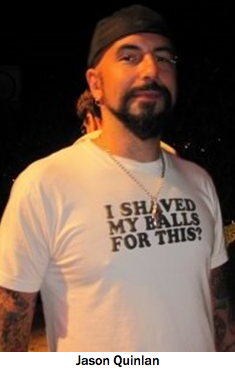 left the apartment, only to return several hours later with a proposal.
left the apartment, only to return several hours later with a proposal.
Instead of trying to sell information about Sheen to TMZ or another gossip publication, Blatt recommended consulting with an attorney who had previously represented women who pursued legal claims against the actor. With Montgomery incapacitated, Quinlan agreed to Blatt’s approach on her behalf.
Within a few hours, Keith Davidson was at the door.
Davidson, Quinlan recalled, launched into a “canned” personal injury lawyer pitch, emphasizing the importance of safeguarding Montgomery’s health and getting her checked for HIV. Montgomery, who later tested negative, signed a contingency fee agreement that called for her to receive 60 percent of any monetary settlement from Sheen. Davidson would get the remaining 40 percent. The lawyer would also be reimbursed for any expenses he incurred.
At the time Montgomery retained Davidson, she was “barely completing sentences,” Quinlan said. In an interview, Jay De Anda, who was Montgomery’s tattoo artist before the couple began dating and eventually wed in 2013, said that, “She was high as a kite on drugs and she signed all these contracts while she was fucking high.” Davidson said that Montgomery did not appear “inebriated,” adding that, “I would not have done that if I thought she was.”
According to De Anda, shortly after Davidson was retained, he asked Montgomery if she could get back into Sheen’s home and photograph the actor’s pill bottles. Montgomery declined, De Anda said, despite Davidson’s contention that, “It’ll help your case.” Asked whether he had made such a suggestion, Davidson replied, “I don’t recall saying anything like that…I mean if you’re in an auto accident, you return to the intersection and photograph it. But to reenter the house for fraudulent purposes, I don’t know if that’s kosher. I don’t recall ever discussing that, I just don’t.”
While Davidson contacted Sheen’s lawyer, he was also arranging to get Montgomery into drug rehab. Quinlan said Davidson--seeking to “protect his investment”--asked him to babysit Montgomery until she could be placed in a treatment facility. One of the claims subsequently presented to Sheen’s lawyer was that Montgomery, upon learning that her sex partner was HIV positive, became despondent and turned to illegal narcotics as a coping mechanism.
Asked whose idea rehab was, Davidson said, “I think it was an agreement between her, Jay, and probably to the extent that I even had the power to agree, me.” When Montgomery asked if rehab would interfere with her claim against Sheen, Davidson said he replied that, “it would probably help prove damages.” De Anda recalled Davidson having a more enthusiastic response to Montgomery’s recovery stint. The attorney, De Anda said, believed that Montgomery’s drug treatment would “put the case on steroids. Those were his exact words.”
Davidson subsequently found a spot for Montgomery at The Lakehouse Recovery Center in Westlake Village near the Los Angeles/Ventura county line. The rehab facility is owned by a friend of Davidson’s and is located about half-a-mile from the lawyer’s $3 million residence on Lake Sherwood (which he shares with his wife and their two young sons). Davidson paid for Montgomery’s drug rehab and also gave her cash advances after she left the treatment facility. He categorized these outlays as “case-related costs.” Quinlan said the  attorney was willing to shell out tens of thousands of dollars on Montgomery’s rehab and living expenses because, “Keith was sure that he was gonna win that case.”
attorney was willing to shell out tens of thousands of dollars on Montgomery’s rehab and living expenses because, “Keith was sure that he was gonna win that case.”
In fact, Davidson eventually struck a lucrative settlement with Sheen’s representatives. The actor agreed to pay Montgomery $2 million to settle her personal injury claims, which were handled privately, not through the filing of a public court complaint. The money would be paid out over a five-year period, which was intended to ensure Montgomery’s compliance with the deal’s nondisclosure provisions.
For his work negotiating the 2012 agreement, Davidson stood to earn $800,000.
The money would be a welcome windfall for the attorney, who had recently suffered several financial setbacks. According to county records, Davidson and his wife Kristi, a registered nurse, lost their Studio City home to foreclosure in 2010. The overextended couple also lost a second property in Arizona to a $1.7 million mortgage foreclosure. Their Scottsdale residence was a 5600-square-foot home with a wine cellar, wet bar, putting green, and a backyard pool and spa that overlooked the 5th fairway at the Troon North golf club. In addition to the foreclosures, the Davidsons had also faced Internal Revenue Service and California state liens over unpaid tax bills. [In July 2017, the California Franchise Tax board filed a new lien against Davidson for $30,000 in unpaid taxes related to his 2014 and 2015 returns.]
Blatt and Quinlan--who delivered Montgomery to Davidson--also shared in the Sheen settlement’s proceeds. The payments to the duo came out of Davidson’s end and were distributed by the lawyer upon his receipt of the Sheen installment payments.
Blatt, 49, is a nonpareil Hollywood hustler, a porn industry veteran and natural gossip who is deeply attuned to the editorial needs of checkbook journalism outfits like TMZ and the National Enquirer. By Davidson’s estimate, Blatt referred him upwards of 15 cases during the five-plus years they worked together as a formidable tag team. Blatt says he stopped bird-dogging clients for Davidson a couple of years ago due to concerns that the lawyer “flies too close to the fucking sun.” Detractors, of course, have accused Blatt himself of 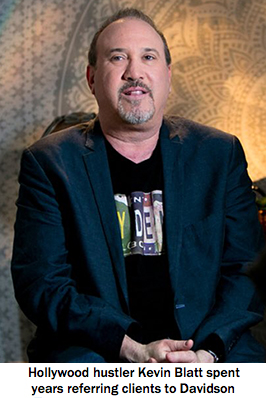 sometimes taking a similar Icarus-like path.
sometimes taking a similar Icarus-like path.
When asked about his payments to Blatt and Quinlan--neither of whom is an attorney--Davidson denied that they amounted to the splitting of legal fees with non-lawyers. The State Bar of California prohibits an attorney from “directly or indirectly” sharing legal fees with anyone who is not a lawyer. Davidson characterized the remittances as gratuities, discretionary payments on his part that were not the subject of any prior agreements. These outlays, he added, were “pursuant to California law.”
This was an explanation that Davidson repeated when he was questioned about other individuals who financially benefited from steering clients to him.
In the McDougal case, a web of overlapping relationships resulted in the Playboy model retaining Davidson, whose contingency fee was 45 percent of the eventual $150,000 payout.
Part of that fee was shared with John Crawford, an ex-cop who now owns and operates five UPS stores in the Phoenix area. Jay Grdina, a former adult film actor and ex-husband of porn superstar Jenna Jameson, also got a cut. Crawford, a McDougal friend, helped connect her with Davidson through Grdina, an Arizona acquaintance. Grdina, whose brother James was once married to McDougal, had previously retained Davidson to handle legal matters related to his business start-ups. Securities and Exchange Commission filings made by Grdina identify Davidson as general counsel and director of one such company (Davidson told TSG that he was never an officer of the firm and that his name was used without permission). James Grdina’s holdings include The Dirty, a gossip blog run by Nik Richie. Davidson said that Richie has steered two clients to him, but received no gratuities in return for the referrals. Richie, Davidson said, just “thought that I was a good lawyer.”


